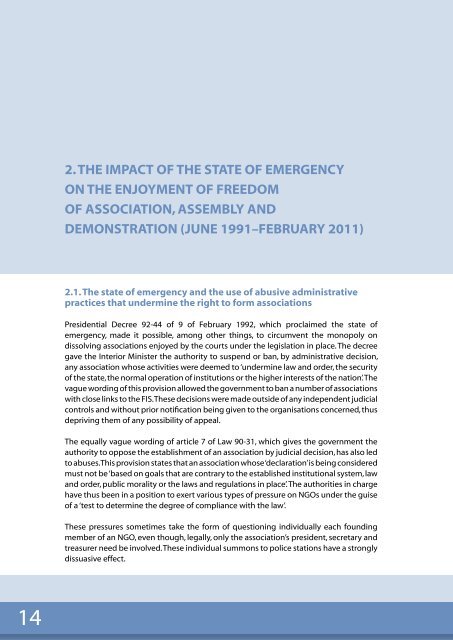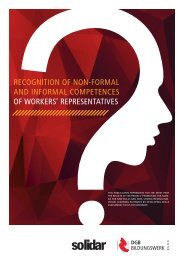Algeria - Solidar
Algeria - Solidar
Algeria - Solidar
Create successful ePaper yourself
Turn your PDF publications into a flip-book with our unique Google optimized e-Paper software.
2. THE IMPACT OF THE STATE OF EMERGENCY<br />
ON THE ENJOYMENT OF FREEDOM<br />
OF ASSOCIATION, ASSEMBLY AND<br />
DEMONSTRATION (JUNE 1991–FEBRUARY 2011)<br />
2.1. The state of emergency and the use of abusive administrative<br />
practices that undermine the right to form associations<br />
Presidential Decree 92-44 of 9 of February 1992, which proclaimed the state of<br />
emergency, made it possible, among other things, to circumvent the monopoly on<br />
dissolving associations enjoyed by the courts under the legislation in place. The decree<br />
gave the Interior Minister the authority to suspend or ban, by administrative decision,<br />
any association whose activities were deemed to ‘undermine law and order, the security<br />
of the state, the normal operation of institutions or the higher interests of the nation’. The<br />
vague wording of this provision allowed the government to ban a number of associations<br />
with close links to the FIS. These decisions were made outside of any independent judicial<br />
controls and without prior notification being given to the organisations concerned, thus<br />
depriving them of any possibility of appeal.<br />
The equally vague wording of article 7 of Law 90-31, which gives the government the<br />
authority to oppose the establishment of an association by judicial decision, has also led<br />
to abuses. This provision states that an association whose ‘declaration’ is being considered<br />
must not be ‘based on goals that are contrary to the established institutional system, law<br />
and order, public morality or the laws and regulations in place’. The authorities in charge<br />
have thus been in a position to exert various types of pressure on NGOs under the guise<br />
of a ‘test to determine the degree of compliance with the law’.<br />
These pressures sometimes take the form of questioning individually each founding<br />
member of an NGO, even though, legally, only the association’s president, secretary and<br />
treasurer need be involved. These individual summons to police stations have a strongly<br />
dissuasive effect.<br />
14<br />
14<br />
EMHRN - The Exercise of the Freedoms of Association, Assembly and Demonstration in <strong>Algeria</strong> - 2011

















